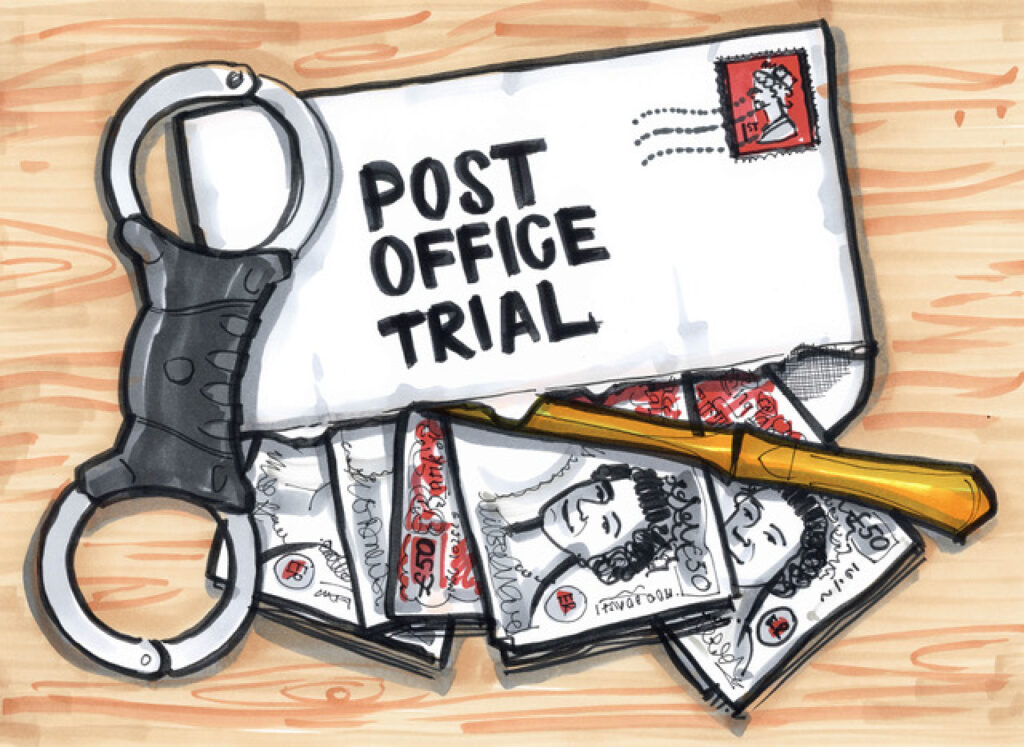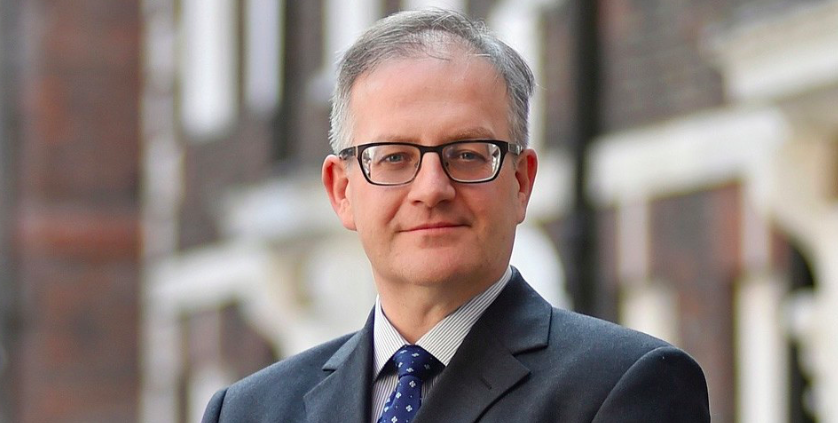Reporting the class action against the Post Office at the High Court


Today’s pre-trial review was a matter of crossing the tees and dotting the ayes before the Horizon trial, which begins three weeks on Monday.
As the “unbelievably clever and super charming” Anthony de Garr Robinson QC (above) will be leading the Post Office’s defence in the Horizon trial, he was in court today. David Cavender QC (who acted for the Post Office in the Common Issues trial) will be back for the third trial this November (see below for more info on that).
In today’s pre-trial review:
– The Post Office suffered a comprehensive defeat in its attempt to stop the judge paying too much attention to Ian Henderson’s evidence in the forthcoming Horizon trial.
– We got some more clarity on how the Horizon trial will proceed.
Let’s deal with the first point first.
Mr de Garr Robinson expended a considerable amount of energy on trying to persuade the judge, Mr Justice Fraser, that accepting the six page witness statement submitted by Ian Henderson, a director of the forensic accounting firm Second Sight, was somehow not fair on the Post Office.
Wary of making a formal strike-out request after the Post Office was defeated in a pre-trial ruling before the Common Issues trial (read the ruling here, it’s pretty comprehensive), Mr de Garr Robinson said he was instead seeking some kind of assurance from the judge that the Post Office would be protected from any adverse consequences which might come from interpreting what Mr Henderson has written as expert evidence as opposed to factual evidence (each party is only allowed one expert each in this trial, and there is a practice direction which excludes any other kind of expert witness evidence).
He developed his point to say that although Mr Henderson only provided a six page written statement, in it he makes reference to at least one Second Sight report written about Horizon (read more on Second Sight’s reports here).
The conclusions reached by Second Sight are hotly disputed by the Post Office and Mr de Garr Robinson was at pains to point that out to the judge. He suggested that any weight given to Second Sight’s reports by the court should only come after a thorough investigation into Second Sight’s methodology, which was certainly possible, but time-consuming, expensive and not what the Horizon trial was about.
Good for the Goose
He also said that if he were to challenge Mr Henderson’s statement under cross-examination, Mr Henderson would introduce other themes, reports, expertise etc and in order to have the tools to properly counter and question anything Mr Henderson says, a huge amount of work would need to be done, which would take Post Office outside the scope of the purpose of the Horizon trial.
The judge asked if the Post Office felt that Mr Henderson’s witness statement amounted to expert evidence effectively admitted by the back door. Mr de Garr Robinson said he did, and said it was therefore specifically prohibited by practice direction.
The judge asked Patrick Green, QC for the claimants if he had anything to say. Mr Green did. He noted “what is good for the goose is apparently not good for the gander” and pointed out that a witness statement by a Post Office employee relied very heavily on the expert evidence from Gareth Jenkins, the Fujitsu IT expert who acted for the Post Office in the trial of Seema Misra [read this for more on the Misra trial].
There was a bit more to-ing and fro-ing and then the judge made his ruling, which was that Mr Henderson’s witness statement should stand in its entirety and that during the trial the Post Office could cross-examine him on it for a maximum of one hour.
Another thing which came out of these exchanges was that Gareth Jenkins from Fujitsu is not being called to be cross-examined, and neither is Professor Charles MacLachlan. Both acted as expert witnesses in the Seema Misra trial – Mr Jenkins for the Post Office and Professor MacLachlan for Mrs Misra.
It’s odd that Mr Jenkins is not going to be cross-examined. Two months before he was acting for the Post Office in the Misra trial (which, don’t forget, led to Mrs Misra being sent to prison whilst pregnant, solely on the basis of Horizon “evidence”) he took part in a meeting about a serious Horizon error which had been affecting several Post Offices for months. The existence of this error had deliberately been kept secret from the affected Subpostmasters, even though it would be potentially leaving them out of pocket. As far as I am aware Mr Jenkins did not disclose the existence of this error to the jury, or to Professor MacLachlan. Perhaps he decided it wasn’t relevant. Because he is not being cross-examined, I suspect we’ll never know.
Scheduling the Horizon trial
The second part of the morning was taken up with a discussion on scheduling. Both parties pleaded for more time to cross-examine the witnesses and experts, which the judge cheerily refused.
During this discussion it was revealed that the independent IT expert appointed by the claimants, Jason Coyne, has discovered 22 Horizon errors. These must have some kind of material impact or they wouldn’t be part of his report. It’ll be interesting to know more about them when that report is released to the court.
The way the trial will proceed is as follows:
11 March – opening arguments from the claimants and defence12 – 14 March – cross-examination of 12 Post Office witnesses by the claimants’ QC18 – 21 March – cross-examination of the claimants’ witnesses by the Post Office QC1 – 5 April – cross examination of the expert witnesses (2.5 days each)10 and 11 April – closing arguments
You’ll notice the court is not sitting w/c 25 March – this was first floated by the judge at the case management conference on Tuesday. It is now definite. Apparently Britain is potentially leaving the EU that week, and HM Courts and Judiciary (including Mr Justice Fraser) need to be on standby for who knows what kind of legal shenanigans.
Among the last things the judge mentioned this morning was me, by name, which woke me up a bit. The judge indicated that his order during the common issues trial that I receive daily transcripts of each day of the trial’s proceedings should continue during the Horizon trial. Which is quite the thing.
The next 12 months
So after Tuesday’s case management conference and today’s pre-trial review, this is where we are now:
28 Feb or first week in March Common Issues trial judgment due.11 March – Horizon trial starts11 April – Horizon trial endsSometime in May – Horizon trial judgment due23 July – case management conference for Breach/Concealment trial (also known as “Round 3”)18 Sep – case management conference for Breach/Concealment trial17 October – pre-trial review for Breach/Concealment trial4 November – Breach/Concealment trial
The Breach/Concealment trial is scheduled to last four weeks. The cases of claimants Naushad Abdulla and Pam Stubbs will be tried. Both Naushad Abdulla and Pam Stubbs were lead claimants in the first trial, so you can read their witness statements and oral evidence here.
Issues of limitation, concealment and breach will be tried. On Tuesday in court pleadings, disclosure and evidence were discussed. The general agreement appeared to be that key moments around specific incidents which have already been identified in each claimant’s case will be gone over in detail, and the Post Office will be required to disclose all the documentation relating to each of these specific incidents so they can be tried fully.
The judgment in this trial could arrive just before Christmas 2019, but bearing in mind the speed at which things are happening now – it’s more likely going to be Jan or Feb 2020.
Only after that will the judge decide how relatable his findings are to the remainder of the claimants.
Whatever the relatability of those findings to the wider GLO cohort, we will get concrete findings for or against Mrs Stubbs and Mr Abdulla. If the judge finds in (either of) their favour, there will be damages.
